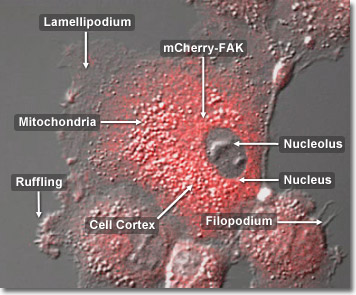Focal adhesions are found on the cell membrane where the cytoskeleton interacts with proteins of the extracellular matrix. The clustering of integrins at these sites attracts a large complex of proteins and initiates the intracellular regulatory process, by which cell migration is controlled. A kinase is a category of enzyme that transfers phosphate groups from high-energy donor molecules (such as ATP) to specific target molecules, a process known as phosphorylation. Focal adhesion kinase (FAK) is protein tyrosine kinase which is recruited at an early stage to focal adhesions and which mediates many of the downstream responses. In the digital video presented above, rabbit kidney epithelial cells (RK-13 line) are expressing a fusion of monomeric Kusabira Orange (mKO) fluorescent protein to focal adhesion kinase.
Video 1 - Run Time: 30 Seconds
Video 2 - Run Time: 61 Seconds
Focal adhesions can contain more than 100 different proteins, an indication of considerable functional diversity. In motile cells, focal adhesions are being constantly assembled and disassembled as the cell establishes new contacts at the leading edge. This has profound implications for the immune system in which white blood cells follow cellular signals to migrate to damaged biological tissue. In the digital video presented above, rabbit kidney epithelial cells (RK-13 line) are expressing a fusion of monomeric Kusabira Orange (mKO) fluorescent protein to focal adhesion kinase.

Focal adhesions are limited to clearly defined ranges of the cell, at which the plasma membrane closes to within 15 nanometers of the extracellular matrix (ECM) substrate. Focal adhesions are in a constant state of flux as proteins continually associate and disassociate with them as signals are transmitted to other parts of the cell, relating to anything from cell motility to cell cycle.